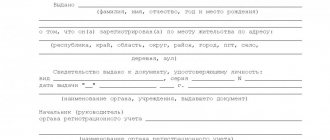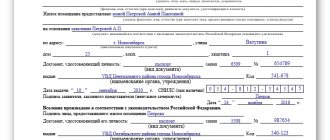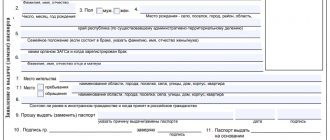The current legislation provides for the rights of the child to receive education, medical care, and maintenance, but in order to exercise these rights it is necessary to register the little citizen, including at the place of residence.
Confirmation is provided by a document of a certain type issued by official bodies.
What does Form 8 mean about registering a child, where to get it, who can apply for it, and what needs to be done for this, we’ll look at it in our article.
What it is
Form 8, or certificate of registration at the place of residence, is a document confirming that the minor is registered at a specific address. The procedure for registering a child under 14 years of age is regulated by:
- Part 2 of Article 20 of the Civil Code of the Russian Federation,
- Part 3. Art. 65 of the Family Code of the Russian Federation,
- Art. 19.15.1 of the Code of Administrative Offenses of the Russian Federation,
- Clause 28 of the Government of the Russian Federation Decree No. 713 of July 11, 1995, as amended in 2021.
The above regulations oblige parents or legal representatives to register, and also provide for liability for failure to comply with the law.
Sample Form 8
The document has a single standard appearance that is used in all regions. Form No. 8 on the child’s registration is filled out according to the approved sample - information about the child, his registration, as well as the employee who issued the certificate (officially it is called a certificate) are indicated. A red FMS stamp, signature and date of issue must be affixed. The form and sample document look like this.
If a minor is not yet 14 years old (i.e. he does not have a passport), registration is allowed only at the same address where the parent (foster parent, guardian, etc.) is registered.
When is it issued?
A certificate of registration at the place of residence is issued upon the occurrence of the following events:
- After issuing the child's birth certificate.
- When changing your place of residence.
- When registering property for a child in the form of an apartment, house or part of such property.
You should know that Form 8 is the child’s second mandatory document and is valid only with a birth certificate.
Children under fourteen years of age are registered at the place of residence of their parents or one of them, guardians, as well as at the location of residential property belonging to the child. Upon reaching the age of 14, minors may be registered at the place of residence of other relatives, unless parents and legal representatives object.
ATTENTION! Children can be registered at the place of residence of their legal representatives even without the consent of the owner of the living space.
Features when registering a newborn and possible problems
The law provides for deadlines for registering a child. They are one month from the moment of birth. It is better not to delay this issue, since otherwise you will have to pay a fine, the amount of which ranges from one and a half thousand to two and a half thousand rubles. The registration period may be longer if the registration is going to be done at the father’s place of residence, but the marriage has not been registered. Then, in addition to other documents, the mother’s consent to this action is also required, which is certified by a notary.
Registration Form 8 of a child is done without the consent of the owner of the premises. But in the future his opinion should be taken into account. There are situations when he refuses to register a newborn in his living space. Then it is recommended to receive a refusal in writing, and then write a statement and send it to the prosecutor's office.
It also happens that parents cannot agree on whose address to register the baby. This happens if they are registered in different rooms. Then they can go to court, which will order an examination and, taking into account the living conditions, make a decision. However, most often, the court takes the mother’s side. And this often happens even when the father’s living conditions are considered better.
In fact, registration form 8 can be obtained without any problems. The main thing is not to miss deadlines and remember that such a certificate will be required for various purposes, and it must be presented along with the birth certificate.
In what cases is it necessary
Registration of a certificate of registration at the place of residence in Form 8 is a necessary document for the implementation of the child’s rights provided for by law. This document must be presented upon registration:
- benefits, including a certificate for receiving maternity capital,
- and registration in children's medical institutions to receive medical care and medical insurance,
- to preschool and school educational organizations of any form of ownership.
In the absence of Form 8, registration for school is possible only if there are free places in the educational institution. In addition, when deciding on the payment of maintenance in the form of alimony by one of the parents, it is necessary to present Form 8 to the court as confirmation of the fact that the child lives with the other parent.
Refusal of service
In some cases, parents may be denied such a service. As a rule, it is associated with an incomplete package of documentation provided to the GUVM employee or doubts about its authenticity. The legislation does not provide for other reasons for refusal.
However, during the process of registering a child, certain problems may arise, which it is advisable to familiarize yourself with in advance. The reason for refusal may be the lack of consent of one parent to register the child at a new address . Such an issue can only be resolved in a court hearing, where the main argument in favor of registration should be the improvement of the child’s living conditions.
Sometimes the guardianship authorities can act as a factor preventing a child from obtaining registration. This applies to situations where the child’s living conditions deteriorate significantly due to a change of place of residence. It is impossible to challenge such a decision, which is why parents will need to look for another, more beneficial option for the child’s place of residence.
Court decision to determine the child’s place of residence
It is also impossible to discharge a child if he is the owner of an apartment, has a share in it, or is registered as such in municipal housing. In such a situation, there is no point in going to court, since it will protect the interests of the baby.
Where to get it
According to the law, the issuance of a certificate in Form 8 is carried out only by the Federal Migration Service and its branches, but you can also obtain a certificate of registration at the place of residence in Form 8 in:
- Multifunctional centers that serve citizens in most major cities of the country.
- Department for accounting and registration of the movement of citizens at the housing organization servicing the house.
- On the Gosuslugi website
It should be noted that registration at the centers takes less time, since employees can use the FMS database to check the data, and the accounting department at the housing organization sends all documents to the migration service and only after receiving the results issues a certificate.
Who can apply
The following can apply to state and municipal authorities to obtain a certificate of registration at the place of residence for Form 8:
- the parents of the minor or one of them, in the latter case, the notarized consent of the second is required,
- legal representatives, including guardians or adoptive parents,
- representative of parents, guardian or adoptive parents under a power of attorney executed in accordance with the law,
- the owner of the living space, subject to the notarized consent of the parents or legal representatives of the child.
Other persons will be denied receipt of the document. In addition, if the power of attorney and consent are not properly executed, an appeal to state and municipal authorities will also be unsuccessful.
Why may they refuse to receive
Refusal to obtain a certificate is not such a rare occurrence and most often it is illegal. In this case, you should file a complaint with a higher authority. And if you receive a negative answer from the officials, file a complaint with the court.
ATTENTION! You should know that refusal on the basis of disagreement with the registration of the child by one of the owners is illegal and can be appealed in court.
The fact that the living space is pledged by a banking institution or under arrest is also in most cases not an obstacle to registration and obtaining a certificate in Form 8. In the latter case, it is necessary to comply with the requirements of the financial organization and obtain a supporting document from them.
Or solve the problem through the courts. Legal grounds for refusal of registration and issuance of a document are:
- The presence of controversial relations between parents about the child’s place of residence. In this case, a court decision is necessary to determine who the minor will be with, and only after that can one apply for Form 8.
- An officially recognized fact of the unsuitability of housing for habitation, that is, recognition of its disrepair or dilapidation of the residential premises in which the parents or legal representatives want to register the child.
Registration of a minor is of a notification nature, not a permissive one, so any refusal is usually not legal.
Obtaining procedure and cost
To obtain Form 8, you must contact one of the above-mentioned state or municipal organizations with a written application of Form 6 established by law, which contains the following information:
- the name of the institution to which the application is being written, that is, the territorial division of the Federal Migration Service,
- personal and passport data of the applicant,
- address of the living space and information about the owner, as well as details of the document confirming ownership,
- personal data of a minor with the obligatory indication of date of birth,
- number and signature of the applicant.
The application form can be obtained at the place of application, or you can download it on the Internet and fill it out at home. Attached to the application are documents confirming the person’s right to register the child and the legal grounds for registration at the address specified in the application. These include:
- Copies of passports of parents or legal representatives who submitted the application.
- A copy of the minor's birth certificate.
- A copy of the certificate of title to the property.
Please note that in some cases you may need:
- certificate stating that the child is not registered at the address of the second parent,
- consent of the second parent to register the child at the applicant’s address,
- a court decision to determine the place of residence of a minor in the absence of consent between the parents,
- extracts from the house register, from the personal account,
- marriage or divorce certificate,
- notarized power of attorney, if the application is submitted by a representative.
After documents are accepted, they are assigned a unique number, which can be used to track the progress of consideration and readiness of the document on the State Services website.
IMPORTANT! The review period is no more than a week.
But in some cases the period may be extended. Typically this is due to:
- the need to deregister the child at the previous address of residence,
- conducting an examination of the authenticity of submitted documents, if necessary.
Legislation from 2021 provides for the submission of an application for the issuance of Form 8 by parents or legal representatives on the State Services website.
Nuances of registering a newborn
The legislation of the Russian Federation does not establish strict deadlines during which a newborn must be registered. There is only an indication that during the first 30 days of his life, the mother can register the child without the consent of the father.
At the same time, if the mother, for good reason, cannot register, the father can do this at the address where he and his mother live together or in her apartment.
After the 30-day period, a child can be registered only with the consent of both parents or guardians.
Another feature is that to register a child, it is not necessary to take into account the living space standards per person in a specific apartment.
Contents of the document and validity period
The received certificate of registration at the place of residence in Form 8 is valid until the child reaches his 14th birthday. But if before this age a minor changes his place of residence for any reason, the certificate becomes invalid and a new one must be issued.
Certificate of Registration Form 8 contains information about:
- For a minor, including full name and date of birth.
- Full address of the place of registration.
- The grounds on which the document was issued.
In addition, the certificate indicates the details of the authority that issued the certificate, the details of the official who issued the certificate, the date of issue and the seal of the organization. The article discusses the features of the certificate of registration at the place of residence of minors.
What is Form 8, when is it needed, who can get it and where, as well as the registration procedure and the validity period of the document.
Results
Important! The father and mother of the child should pay attention to the fact that the employee of the organization who issues you a certificate in form number 8 issues a separately issued form of the established form, and does not put a registration stamp on the birth certificate. Still, the birth certificate is the most important document for a newborn and it is advisable not to put unnecessary stamps on it. Parents also need to remember that the certificate in form number eight is drawn up and handed out in one copy, and if it is lost or damaged for some reason, then you will need to get a duplicate.
203











